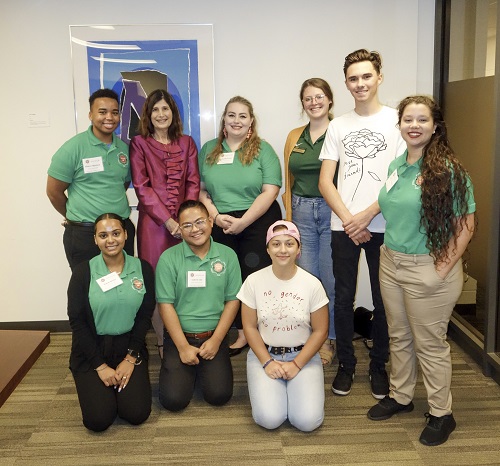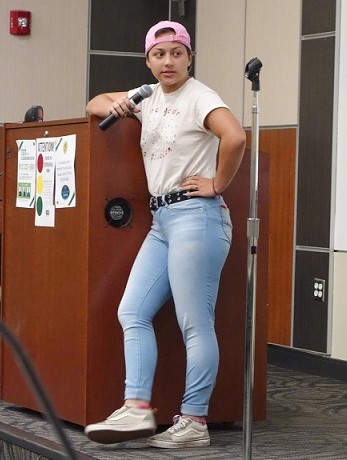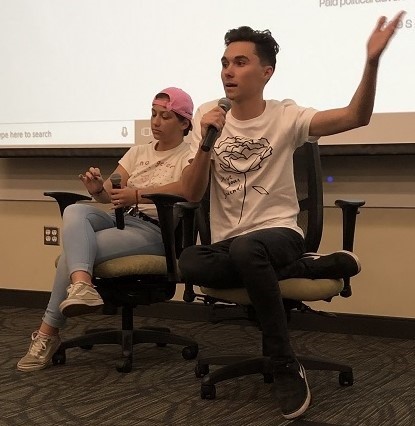Is gun violence a political or public health issue? Parkland school shooting survivors speak out
On June 11, the USF College of Public Health’s (COPH) Activist Lab, in partnership with USF Health, hosted a gun violence prevention and advocacy presentation.
Speakers at the event were David Hogg and Emma González, two students who survived the February 2018 mass shooting at Marjory Stoneman Douglas (MSD) High School in Parkland, Fla. A gunman (and former student), using a semi-automatic rifle, shot and killed 17 students and staff at the school and injured 17 others.
Both Hogg and González—who’s best known for her battle cry “We call BS”—are advocates for gun violence prevention. They helped form MSD Never Again, a gun control advocacy group founded by MSD students. They also helped organize March for Our Lives, the largest single-day protest against gun violence in U.S. history. Last summer, they toured the country speaking about gun violence prevention.

“Before the shooting, I was interested in broadcast journalism,” said Hogg, who will enter Harvard University in the fall to study public health policy, American history and government. “I was interested in telling people’s stories. Now I tell the stories of people who aren’t here, like Joaquin Oliver, who died at my school. He fled Venezuela with his family to escape violence, only to be killed in his own classroom in what was thought to be the safest school in Florida.”
Their USF talk, attended by roughly 150 students, faculty, staff and the public, focused on reframing gun violence from a political issue into a public health one.
“Guns and cigarettes have much in common—they both kill a lot of people,” commented Hogg. “But one is on the decline. We didn’t do that by banning cigarettes, we did it by limiting the amount of nicotine in them to make them less addictive. Same with guns. We are not asking for a ban on guns, just to reduce the demand for them.”
González, a student of social justice and social activism at New College of Florida in Sarasota, agreed.
“We’re not fighting for guns to be taken away. We’re fighting for banning assault weapons and high-capacity magazines, for better background checks, for more funding for gun violence prevention. When we actually sit down and talk with some of the protestors at our events, we agree on a lot.”

Hogg noted that just as diseases cluster, so does gun violence. He showed the audience a slide with clusters of dots. Red dots were shooting deaths; yellow dots were shooting injuries.
“Those aren’t dots, they’re people. They’re friends. They’re kids. They’re young people who wanted to go to college, to go anywhere and have a future,” said Hogg, who was wearing a “Save Your Friends” t-shirt. “But that was all taken away because of gun violence. Even though this is a public health issue, it has become a political one because people make money off it. The NRA has as much to do with gun violence in America as the tobacco companies have to do with lung cancer.”

Both Hogg and González argue that gun violence can only be ended with research and interventions—things like bringing after-school programs to poorer communities, increasing access to grocery stores and making mental health care more affordable and accessible.
They urged the audience:
- To vote. “This is not a Republican or Democrat issue,” said Hogg. “It’s about electing morally just leaders. You need to vote for your survival.”
- Organize and attend town hall meetings on gun violence.
- Get involved in groups, protests and marches.
- Encourage the medical community to hand out gun locks to their patients, much like bike helmets are distributed.
- Get into gun violence prevention research. “I’m not just here to speak, I’m here to recruit,” said Hogg, who noted there are only eight researchers currently studying gun violence prevention in the country. “In the next few years, funding won’t be the problem. It will be the lack of people qualified and motivated to do the job.”
Other takeaways:
- “Our efforts have been incredibly successful. Now candidates are running on gun violence prevention, not the Second Amendment. The Second Amendment and not having kids go through school shootings are not mutually exclusive.”—David Hogg
- Speaking on the issue of arming teachers in classrooms: “It’s like fighting fire with fire. More guns makes the fire bigger. It’s not safe.”—Emma González
- Commenting on the need for more accessible and affordable mental health care, especially after mass shootings: “Most schools in America have a plan for what to do if there’s an active shooter. We talk about how we’re going to make this door bulletproof. But we don’t talk about what happens after the event, mental health wise. We don’t talk about the trauma it will cause and how to prevent the suicides that will follow.”—David Hogg
- “We can think, ‘How would our lives be different if this thing [the Parkland shootings] didn’t happen?’ But there are other things that have happened that are also really traumatizing and impactful. You have to roll with the punches you’re served.”—Emma González

In closing Hogg told the audience, “As a human being and an American, I choose to love rather than hate. I choose to fight for something, rather than solely against it. We may not be the generation to end gun violence, but we can be the first generation to take a step toward the finish line.”
Story by Donna Campisano, USF College of Public Health
